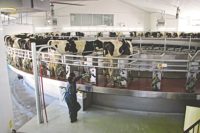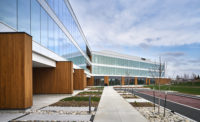Clemson University’s LaMaster Dairy Farm, Clemson, S.C., unveiled a new robotic milking system.
“We started [designing the dairy] about 5 years ago, and it was designed for total cow comfort,” says Steve Waggoner, dairy farm manager. “It milks the cows individually, and you can get individual information on each cow. The robotics run 24/7. It will milk a cow now, two hours from now or 10 hours from now, without having to use manual labor in shifts.”
The DeLaval VMS V300 fully robotic milking system from DeLaval, Kansas City, Mo., is a guided milking system that allows each cow to be milked according to her individual needs and capacity. The cows average about three milking visits per day over the entire herd. Fresher cows that have calved more recently visit the milking stall up to six times a day.
“The cows can come and go without people moving them manually and causing them more stress,” Waggoner says.
The cows wear activity monitors that track daily movement and alert dairy managers when activity is high for improved reproduction and when activity is low to identify possibly sick or lame cows.
“It tells you when a cow is off in milk production, so you can flag her to see if she’s getting sick. The technology helps us take care of problems with the cows quicker and faster and maybe diagnose and treat the animals before they really have a lot of problems,” Waggoner says.
The cutting-edge dairy also has systems designed to lower environmental impact.
For instance, the new dairy has an automated system that washes and recycles the sand that’s used for bedding.
“Over the past year, we’ve only had four truckloads of sand delivered. In the previous dairy, we would have had 48 truckloads delivered in a year. That’s a big cost and environmental savings in not just sand, but in the fuel used by the trucks traveling from Tennessee to deliver that sand,” says John Andrae, assistant director of Clemson’s research farms.
Furthermore, this high-tech dairy is not just a showpiece, but another way in which Clemson is continuing its commitment to support the South Carolina agriculture industry.
“Clemson has been and will always be a university that is honored to play a significant leadership role in the field of agriculture. This new technology will help us play an even greater role in the dairy industry, and is the embodiment of our land-grant mission moving into the 21st century and beyond,” says Jim Clements, president.






